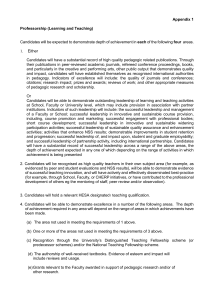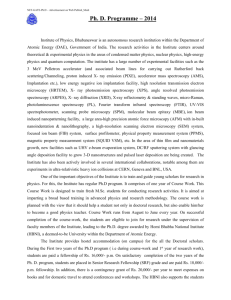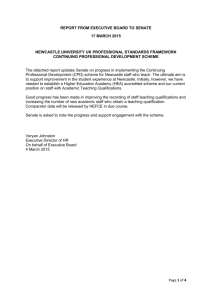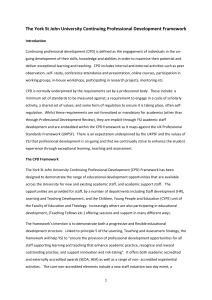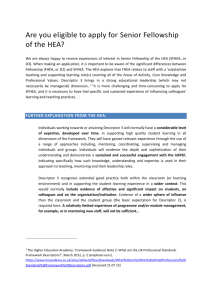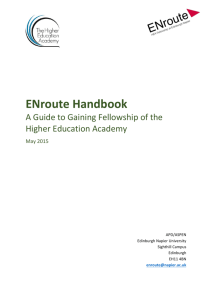Appendix 3 - Senior Lectureship (Learning
advertisement
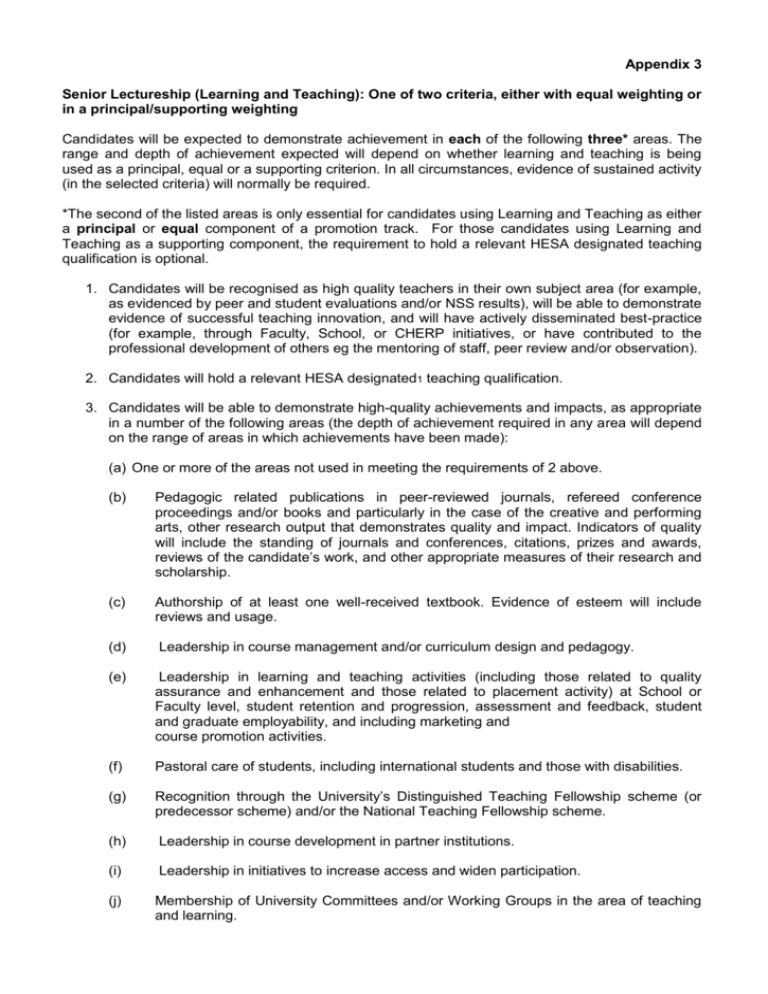
Appendix 3 Senior Lectureship (Learning and Teaching): One of two criteria, either with equal weighting or in a principal/supporting weighting Candidates will be expected to demonstrate achievement in each of the following three* areas. The range and depth of achievement expected will depend on whether learning and teaching is being used as a principal, equal or a supporting criterion. In all circumstances, evidence of sustained activity (in the selected criteria) will normally be required. *The second of the listed areas is only essential for candidates using Learning and Teaching as either a principal or equal component of a promotion track. For those candidates using Learning and Teaching as a supporting component, the requirement to hold a relevant HESA designated teaching qualification is optional. 1. Candidates will be recognised as high quality teachers in their own subject area (for example, as evidenced by peer and student evaluations and/or NSS results), will be able to demonstrate evidence of successful teaching innovation, and will have actively disseminated best-practice (for example, through Faculty, School, or CHERP initiatives, or have contributed to the professional development of others eg the mentoring of staff, peer review and/or observation). 2. Candidates will hold a relevant HESA designated1 teaching qualification. 3. Candidates will be able to demonstrate high-quality achievements and impacts, as appropriate in a number of the following areas (the depth of achievement required in any area will depend on the range of areas in which achievements have been made): (a) One or more of the areas not used in meeting the requirements of 2 above. (b) Pedagogic related publications in peer-reviewed journals, refereed conference proceedings and/or books and particularly in the case of the creative and performing arts, other research output that demonstrates quality and impact. Indicators of quality will include the standing of journals and conferences, citations, prizes and awards, reviews of the candidate’s work, and other appropriate measures of their research and scholarship. (c) Authorship of at least one well-received textbook. Evidence of esteem will include reviews and usage. (d) Leadership in course management and/or curriculum design and pedagogy. (e) Leadership in learning and teaching activities (including those related to quality assurance and enhancement and those related to placement activity) at School or Faculty level, student retention and progression, assessment and feedback, student and graduate employability, and including marketing and course promotion activities. (f) Pastoral care of students, including international students and those with disabilities. (g) Recognition through the University’s Distinguished Teaching Fellowship scheme (or predecessor scheme) and/or the National Teaching Fellowship scheme. (h) Leadership in course development in partner institutions. (i) Leadership in initiatives to increase access and widen participation. (j) Membership of University Committees and/or Working Groups in the area of teaching and learning. (k) Grants awarded in support of pedagogic research. (l) Editorial roles including membership of editorial boards or conference organising committees. (m) Membership of national or international committees associated with pedagogic research and/or professional practice. (n) External experience of the evaluation of learning, teaching and assessment eg QAA reviewer, consistent involvement in external examining. (o) Recognition through the Students’ Union Learning and Teaching Awards. (p) Senior Fellowship or Principal Fellowship of the Higher Education Academy (where not used for the purposes of meeting essential criterion 2 above). * Some factors are involved in more than one area of activity. Where this is the case they can only be included once in an application for promotion. Note: In all cases evidence will be sought to demonstrate that candidates are contributing fully to University/Faculty learning and teaching initiatives, including: assessment and feedback; employability; participation in the peer supported review scheme; participation in the student and module monitoring evaluation schemes; the provision of detailed teaching/learning plans for each module taught in line with University/Faculty guidelines; the provision of comprehensive and timely feedback to students; ongoing engagement with CPD activities and adherence to University/Faculty policy on moderation. In addition to meeting the criteria for promotion, all applicants are expected to be in good academic standing with their peers (both internal and external), as evidenced through good working relationships and holding their own and colleagues work and contribution in high esteem, collaborating in matters relating to research, learning and teaching, and academic enterprise as appropriate, and working for the benefit of the School/ Department and the University as a whole. 1 Footnote HESA designated teaching qualifications More than one may apply to individual candidates Successfully completed an institutional provision in teaching in the higher education sector accredited against the UK Professional Standards Framework (UKPSF) eg PgCHEP*. This includes courses recognised by SEDA against its Named Awards that are accredited against UKPSF (supporting) Learning; Learning, Teaching and Assessing). Recognised by the HEA as an Associate Fellow. Recognised by the HEA as a Fellow. Recognised by the HEA as a Senior Fellow. Recognised by the HEA as a Principal Fellow. Holder of National Teaching Fellowship Scheme Individual Award. Holder of PGCE in higher education, secondary education, further education, lifelong learning or any other equivalent UK qualification. Accredited as a teacher of their subject by a professional UK body. Other UK accreditation eg Diploma, Masters, or Doctorate in teaching in HE. Overseas accreditation or qualification for any level of teaching. * Candidates holding Qualified Teacher Status or a PGCE qualification are required to complete only the non-pedagogic components of the PgCHEP as determined through a development needs analysis by their line manager.
